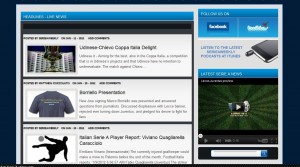Rinaldi Reminisces: Roma v Sampdoria
When Vinnie Montella bit the hand that would feed him
These are sombre times for Sampdoria but it has not always been that way. The Blucerchiati have been star turns in some memorable episodes of Italian football both domestically and in Europe. One of their more epic performances was delivered by Vincenzo Montella about 15 years ago – when he helped to destroy a club he would later serve both as player and manager.
It was just the third round of the 1996/97 campaign when the Doriani made the trip to Rome to face a Giallorosso side sitting joint top of the table with Paul Ince’s Inter and, more surprisingly perhaps, an Igor Kolyvanov-inspired Bologna. Sven Goran Eriksson was in charge of a Genoese outfit still constructed around the classic skills of Roberto Mancini. His opposite number, Argentinian Carlos Bianchi, could count on an all-South American strike force of Abel Balbo and Daniel Fonseca.
The visitors came with a 4-3-3 formation that put Mancio at the heart of the attack with lesser and more youthful lights like Marco Carparelli and Vincenzo Jacopino beside him. Juan Sebastian Veron ran the midfield flanked by Frenchmen Christian Karembeu and Pierre Laigle. In defence, disciplinary nightmare David Balleri and former Milan legend Alberigo Evani provided forward impetus from full-back roles. Moreno Mannini and Sinisa Mihajlovic stood guard in front of Fabrizio Ferron in goal.
Roma responded with a 4-4-2 designed to provide a solid platform for their Argentinian and Uruguayan hitmen. Swedish midfield organiser Jonas Thern was supported by Francesco Statuto, Damiano Tommasi and Amedeo Carboni. The defensive line included the elegance of Brazilian Aldair and the more rough-house Enrico Annoni. Former Samp man Marco Lanna and disastrous Argentine import Roberto Trotta completed the line shielding goalkeeper Giorgio Sterchele.
The game would turn out to be an initially tense one, locked at 0-0 until nine minutes into the second half when a defensive error let the Giallorossi take the lead. An overly-nonchalant Mihajlovic lost possession near his own goal and Balbo was quick to pounce before any other Doria defenders could close him down. It prompted the move which would swing the match.
Sensing he needed to turn the tide quickly, Eriksson removed Veron and sent out Montella. Having already been forced to replace Laigle with Marco Franceschetti in the first half, he only had one substitute left at his disposal. He used it before the hour mark to bring on old-stager Giovanni Invernizzi to replace an ineffectual Carparelli. It was a huge gamble but one which paid off in minutes and in some style.
There was more than a little good fortune in Samp’s 65th minute equaliser. A run started by Karembeu saw Montella play the ball into the path of Mancini. His shot was blocked by Sterchele but rebounded off Aldair to trickle into the home side’s goal.
Bianchi’s response, having already replaced Statuto with the more attacking Francesco Moriero, was to imbalance his team even further by putting Martin Dahlin into the fray for Tommasi. “I had to go for the win,” insisted the Roma boss after the game. But it backfired on him disastrously.
Mancini flourished in the space left behind the Giallorosso defence and pulled away on the left flank in the 74th minute before driving towards the bye-line. He then cut back a perfect low cross to Montella who happily passed the ball into the roof of the net. The Little Aeroplane set off in a celebration that would give Romanisti a lot of pleasure in years to come, but not in this particular encounter.
Two minutes from time, Mancio delivered the coup de grace and in trademark style. He again broke clear on the left and evaded a despairing dive from Sterchele to round the goalkeeper. He then made it look the simplest of things to curl home a shot from a narrow, narrow angle. The current Manchester City boss was a player with skills very few in the Italian game have ever been blessed with.
He helped to complete the rout in injury time from the same flank. A low, driven shot was parried straight to the feet of Montella who was only too happy to tap another goal home. Roma’s disastrous capitulation was complete and the knives were already out for their manager.
“The dream is already over!” blasted the Corriere Della Sera just three weeks into the season. “The little Roma of last season is back – wasteful up front with Fonseca who messes up the easiest of chances and calamitous at the back with defensive lapses caused by inexplicable spells of taking the foot off the gas.”
“Sampdoria were clinical,” insisted Bianchi. “We had a couple of chances to kill the game after Balbo’s goal and we missed them. They took all the opportunities that came their way. But that is football, nothing comes easily.”
“I don’t think Roma played badly,” he insisted. “Before we went ahead we had two or three chances to take the lead. But I don’t think there was such a big gap between the two sides.”
One man at the centre of the fans’ displeasure was Trotta, a part of Bianchi’s Velez Sarsfield side which had won the Copa Libertadores a couple of years before. He hit back at a perception that he was a manager’s favourite who was not up to Serie A standards.
“When we lose, everyone whistles me,” grumbled Trotta afterwards. “That hurts me. I am not this club’s saviour, the team wins or loses as a group. I am here to play for Roma, not for Bianchi.”
History, however, would show that he would not play much for the Giallorossi and end up cited as one of the biggest Bidoni – disastrous overseas players – of the last 20 years. His manager did not fare much better, being shown the door in springtime as Roma struggled near the bottom end of the table. They would end the campaign with just 41 points – a mere four points above relegated sides like Cagliari and Perugia.
Sampdoria would finish in sixth place that campaign with far and away the best attack in Italy and qualification for the UEFA Cup secured. Montella alone struck 22 times in Serie A (finishing second in the capocannoniere race to a young Atalanta forward called Filippo Inzaghi) and Mancini grabbed 15 himself. They were one of the most prolific attacking partnerships ever seen in the famous hooped shirts. How their team could have used their likes to save them from their disastrous fate this season.


 Send us a timely, compelling post and we'll consider it for publishing on the site with mention of your name and social-media link.
Send us a timely, compelling post and we'll consider it for publishing on the site with mention of your name and social-media link.




